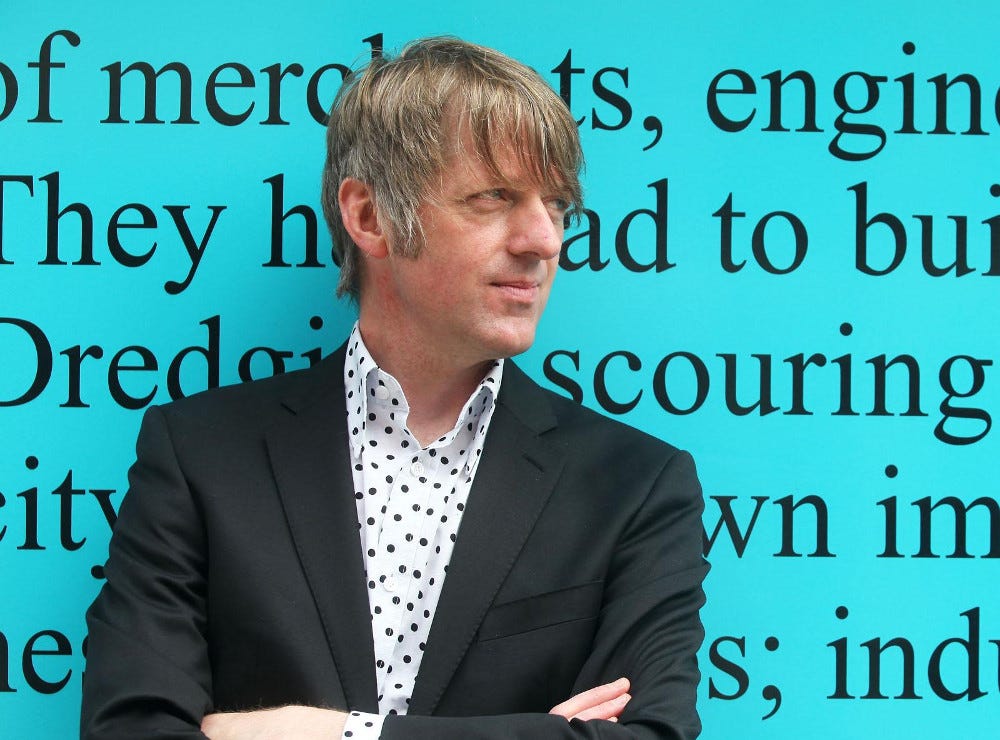Q&A with Glenn Patterson
"I have never worked on anything where so many people came up to me afterwards wanting to talk."
Throughout the Orwell Festival we are sharing new writing and insights from this year’s finalists. In this next piece, we caught up with the writer, journalist and documentary-maker Glenn Patterson, who is shortlisted for The Orwell Prize for Journalism 2022 alongside producer Conor Garrett for their series The Northern Bank Job, which unearths the far-reaching ramifications of the biggest bank heist in British and Irish criminal history.
What made you return to the story? How did the project get started? Why podcast?
I had worked with producer Conor Garrett previously, on a documentary for Radio 4 on Belfast’s peacelines. He knew that I had written about the robbery, the week before Christmas 2004, of the Northern Bank in Belfast city centre – I had hoped to write a screenplay but ended up with an essay – and phoned me up one day to talk about revisiting the story. He had in mind the 15-minute slot on weekday afternoons, between The World at One and the two o’clock news, a format that lent itself well to podcast. The ten instalments added up to almost two and a half hours of airtime, which began to feel as though it offered a really substantial opportunity to go into the background to the robbery, and its consequences, as well as the events of December 2004.
Then Bobby Storey died. Storey was a senior figure in the IRA, once named in House of Commons as the person responsible for planning the robbery. His funeral in Belfast at the height of Coronavirus restrictions was the cause of considerable controversy and, like the heist nearly two decades before, hugely destabilising. Any doubt that Conor and I might have had evaporated. If ever there was a moment to tell the story of the Northern Bank Job, this was it.
What were the biggest challenges you faced researching and reporting? Did your approach to the investigation change as it developed?
The biggest challenge to the investigation of the Northern Bank robbery was the fact that everything in Northern Ireland has for two and a half decades been subservient to the peace process. Or, rather, that the peace process is invoked as a reason not to delve too deeply into certain events. Into how, in this instance, you could have a party in a power-sharing executive if it turned out its leading lights had – at the very least – prior knowledge of the theft of £26.5m. Or how, by the time the only person ever to stand trial for the robbery appeared in court, no attempt was made (the judge was quite explicit in his direction) to determine whether a paramilitary organisation had been involved. No attempt made either to find out where all the money had gone.
Then there was the rioting that erupted close to Belfast city centre on Good Friday 2021, just as we were finishing recording the series, which demanded a particular re-framing of the story. The series was no longer just about what at the time was the biggest bank heist in British or Irish history. It was about the missed failures and missed opportunities that have followed the Good Friday Belfast Agreement.
Why, ultimately, does this story matter?
The question at the heart of the Northern Bank Job is what we price we are prepared to pay, or should be expected to pay, for peace, and who exactly sets the terms? Flippantly, you could say £26.5m – there was a suggestion that the IRA used the money as a pension fund for its ‘retiring’ volunteers. The podcast posits that it cost us much, much more, that the robbery and the failure to investigate it fully, had a corrupting influence on politics here that is still being felt today.
What was the initial reception?
I have been writing professionally for thirty-five years – novels, short stories, books on Irish politics, plays, screenplays, librettos, memoir – and I have never worked on anything where so many people came up to me on the street afterwards wanting to talk: testimony, first of all, to the reach of podcast. A sizeable number (often dropping their voices, glancing over their shoulders) told me they had never thought they would hear some of the things we did say said. Which was (it bears repeating), the Provisional IRA robbed the Northern Bank, six years after the Good Friday Agreement, and with the knowledge of leading members of Sinn Fein. A fact to which, ultimately, the British and Irish governments were content to turn a blind eye.
What does Orwell mean to you?
It is no exaggeration to say that George Orwell helped shape my whole approach to writing and politics. Animal Farm was on the reading list for our English GCE (no S in there in those days) and I quickly became addicted: I liked the novels well enough, but it was Down and Out in Paris and London, The Road to Wigan Pier and Homage to Catalonia I responded to most. To me, as someone on the Left politically, his refusal to countenance totalitarianism and censorship – any dogma that loses sight of the human – was, and remains, hugely important.
Glenn Patterson has published eleven novels and five works of non-fiction, most recently The Last Irish Question: Will Six Into Twenty-Six Ever Go? (Head of Zeus) He co-wrote the feature film Good Vibrations (BBC Films) and is currently Director of the Seamus Heaney Centre at Queen’s University Belfast.
Conor Garrett is a BBC audio documentary producer based in Belfast. He makes programmes for BBC Radio 4, Radio 3, World Service and BBC Northern Ireland. His work has been recognised through Celtic Media and PPI awards and Conor won a Special Commendation at the 2021 Prix Europa Festival.




